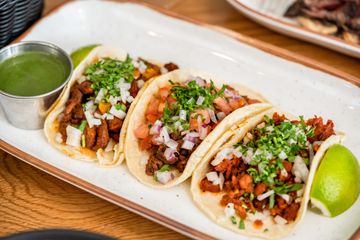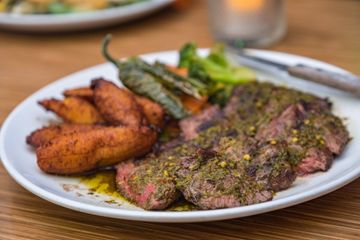Is Mexican Food Healthy? Unpacking the Nutritional Perks of Typical Components
The concern of whether Mexican food is healthy and balanced invites an expedition of its standard active ingredients. Beans and corn act as fundamental staples, rich in healthy protein and fiber. Avocados provide beneficial fats, while various herbs and flavors add taste and health and wellness advantages - freshly made guacamole. Together, these components develop a tapestry of nourishment. The healthiness of Mexican cuisine often depends on prep work methods and section dimensions. What function do these factors play in determining its total dietary worth?
The Power of Beans: Healthy Protein and Fiber-Rich Staples
Often forgotten, beans offer as a foundation of Mexican food, supplying a riches of nutritional advantages. Rich in protein, they are an exceptional plant-based option for those seeking to meet their nutritional protein needs. This high healthy protein material supports muscular tissue repair service and development, making beans invaluable for both vegetarians and meat-eaters alike. Additionally, beans are a phenomenal resource of dietary fiber, which assists in digestion and promotes a sensation of volume, possibly assisting with weight administration.
The selection of beans utilized in Mexican recipes, such as black beans, pinto beans, and kidney beans, adds to a diverse flavor account and can enhance meals nutritionally. Additionally, beans are reduced in fat and contain essential nutrients, including magnesium, folate, and iron. Together, these attributes make beans an important component, providing both sustenance and food in typical Mexican fare.

Corn: a Versatile Grain With Nutritional Conveniences
Corn stands apart as a functional grain basic to Mexican food, celebrated not just for its culinary applications however also for its impressive dietary profile. As a primary active ingredient in dishes like tortillas, tamales, and pozole, corn offers important nutrients that add to a balanced diet regimen. Rich in carbohydrates, it functions as a significant power source, while additionally being low in fat, making it a positive choice for various dietary demands.
Furthermore, corn is a good resource of dietary fiber, which aids in digestion and advertises satiation. It consists of considerable quantities of vitamins such as B-complex vitamins, which are essential for basal metabolism. The existence of anti-oxidants, especially carotenoids, adds to total health and wellness by decreasing oxidative stress. Additionally, corn is gluten-free, accommodating those with gluten level of sensitivities. Overall, the nutritional advantages of corn highlight its significance in traditional Mexican food and its role in a healthy diet.
Avocados: Healthy Fats and Nutrients in Every Bite
Avocados play a substantial duty in Mexican food, complementing dishes with their velvety texture and abundant taste. Beyond their culinary charm, avocados are commemorated for their outstanding nutritional account. They are an abundant source of healthy monounsaturated fats, which can help lower bad cholesterol levels and support heart health and wellness. In addition, avocados are packed with vital vitamins and minerals, consisting of potassium, vitamin E, and B vitamins, adding to general health.
The high fiber material in avocados aids food digestion and promotes satiation, making them a beneficial addition to any dish. Their special nutrient structure can also sustain skin wellness and offer anti-inflammatory benefits. Integrating avocados into typical Mexican recipes or appreciating them as a standalone snack can boost both taste and nutrition, showing why they are a cherished staple in Mexican cuisine. Overall, avocados use a scrumptious means to take pleasure in healthy and balanced fats and vital nutrients in every bite.

Herbs and seasonings: Flavorful Health Boosters
While enjoying the rich tastes of Mexican cuisine, one can not ignore the crucial duty that spices and natural herbs play in improving both taste and health and wellness. Active ingredients such as chili, cilantro, and oregano peppers not only add to the dynamic flavor profile yet also give substantial wellness advantages. Cilantro is recognized for its detoxing buildings, helping to get rid of hefty metals from the body, while oregano is loaded with antioxidants and possesses anti-inflammatory effects.
Chili peppers, a staple in many Mexican recipes, include capsaicin, which has actually been connected to boosted metabolism and discomfort relief. Furthermore, spices like cumin and coriander support digestion and may aid in blood sugar law. Including these flavorful health boosters right into meals not only boosts the culinary experience but likewise promotes overall well-being, making Mexican cuisine not just tasty, but likewise nutritionally useful.
Typical Food Preparation Approaches: Enhancing Nutrition and Taste
Standard food preparation methods in Mexican food play an important duty in improving both nutrition and flavor, as they frequently focus on time-honored techniques and fresh components. Strategies such as nixtamalization, where corn is saturated and cooked in an alkaline remedy, not only boost the nutrient profile of tortillas yet additionally boost their digestibility - freshly made guacamole. Additionally, the usage of slow cooking techniques, like cooking or braising, permits flavors to meld beautifully while maintaining the honesty of the ingredients

Regularly Asked Inquiries
Are Mexican Food Portions Typically Larger Than Various Other Foods?
Mexican food portions are often larger than those of numerous various other foods. This characteristic shows conventional dining techniques, stressing public sharing and hearty meals, which can cause a much more significant offering size generally.
Exactly how Does the Prep Work Technique Affect Healthiness of Mexican Food?
Preparation methods considerably influence the healthfulness of Mexican food. Strategies such as cooking or steaming maintain nutrients, while frying can enhance undesirable fat content. Selections of ingredients and cooking designs ultimately identify overall nutritional value.
Can Mexican Food Be Customized for Details Nutritional Limitations?
Mexican food can certainly be customized for particular dietary constraints. Alternatives, such as making use of corn tortillas for gluten-free diet plans or integrating more veggies, enable individuals to take pleasure in typical tastes while fitting different nutritional demands.
What Prevail Mistaken Beliefs Regarding Mexican Food and Health And Wellness?
Typical mistaken beliefs concerning Mexican food consist of the belief that it is naturally harmful, extremely hot, and only concentrated on fats. Actually, standard dishes commonly include nutritious components and can be customized to different nutritional requirements.
Are There Much Healthier Choices at Mexican Restaurants?
Healthier options at Mexican restaurants commonly include smoked meats, beans, and fresh veggies. Choosing dishes that emphasize whole active ingredients and avoiding hefty sauces can lead to a much more healthy dining experience, advertising general well-being.
The range of beans made use of in Mexican recipes, such as black beans, pinto beans, and kidney beans, contributes to a diverse flavor profile and can boost meals nutritionally. Avocados play a substantial click for info function in Mexican food, matching meals with their creamy structure and abundant taste. Integrating avocados right into traditional Mexican recipes or enjoying them as a standalone snack can improve both flavor and nutrition, demonstrating why they are a beloved staple in Mexican cuisine. While appreciating the abundant tastes of Mexican food, one can not ignore the crucial duty that spices and herbs play in boosting both taste and wellness. Conventional cooking methods in Mexican food play a necessary role in boosting both nutrition and flavor, as they usually focus on classic techniques and fresh components.